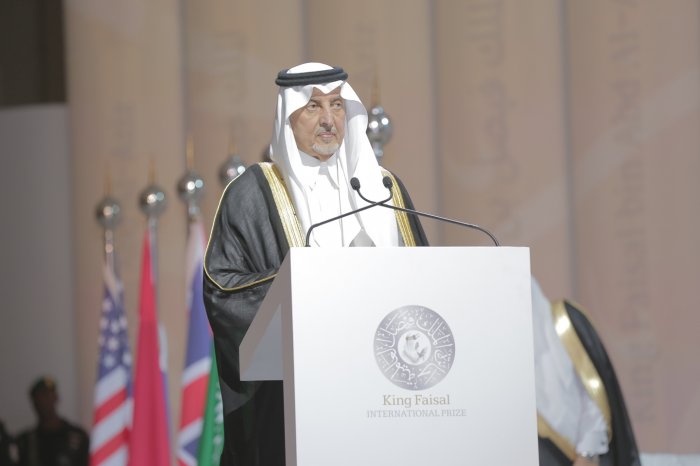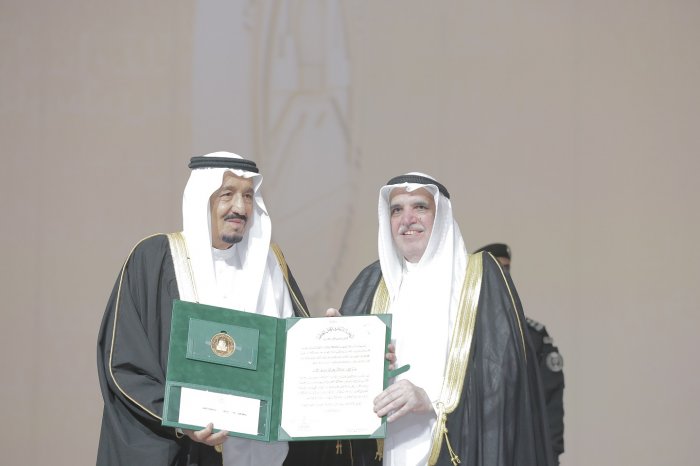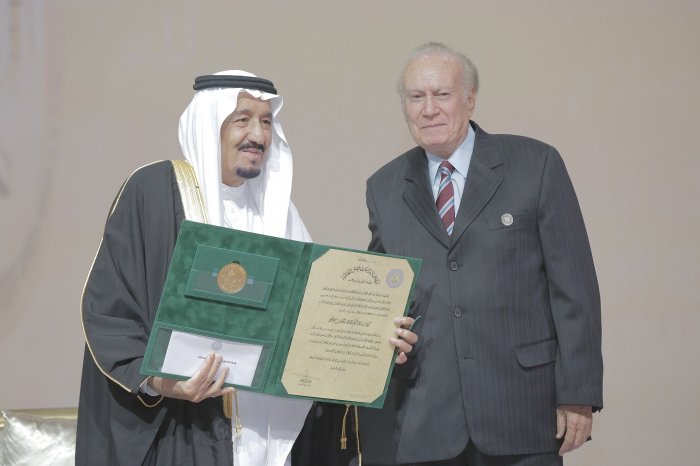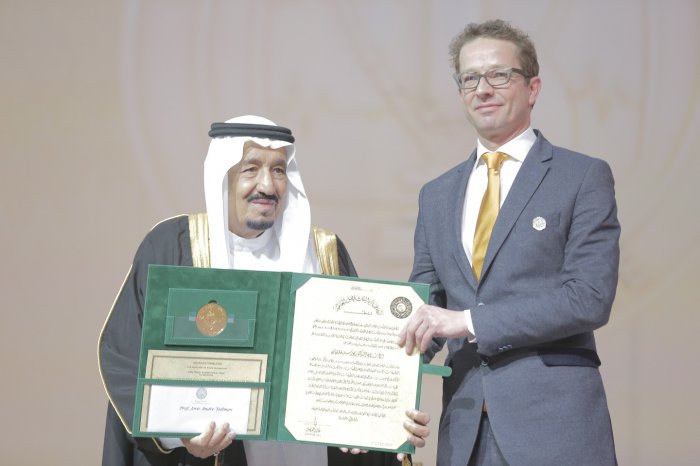
Royal reception for winners of the 38th annual King Faisal International Prize
Spanning the fields of science, literature and Islamic thought, the eight recipients of this year’s King Faisal International Prize – the most prestigious award in the Islamic world – were presented to His Majesty King Salman bin Abdulaziz Al Saud tonight at a VIP ceremony in Riyadh’s Al Faisaliah Hotel.
Speaking at the reception, HRH Prince Khalid Al Faisal, director of the King Faisal Foundation, congratulated the laureates, saying: “Winners of the King Faisal International Prize who have dedicated their lives for the sake of human happiness, I congratulate you.”
The King Faisal International Prize for Medicine was jointly awarded to Dutch professors Han Grrit Brunner (Professor of Medical Genetics at the Radboud University, part of Nijmegen Medical Center) and Joris Andre Veltman (Professor of Translational Genomics at Radboud University), for developing a new method of analyzing DNA – known as next generation sequencing.
The King Faisal International Prize for Science was jointly awarded to the UK’s Professor Stephen P Jackson (Professor of Cancer Research at the Gurdon Institute) – for his contribution to defining the link between the basic mechanism of DNA instability and its relationship to cancer – and US-Indian Dr Vamsi K Mootha (Professor of Systems Biology, Harvard Medical School) for his investigations into mitochondria, which generate the energy for our cells to do their job. His research identified the link between molecular factors involved in mitochondrial dysfunction and major human diseases such as diabetes.
The King Faisal International Prize for Service to Islam was awarded to Sheikh Dr Saleh Abdullah bin Humaid (Saudi Arabia) – Imam of the Holy Mosque in Makkah and President of the International Islamic Fiqh Academy Jeddah – who was recognized for his leadership and commitment to Islamic understanding and education.
The King Faisal International Prize for Islamic Studies was awarded to Professor Abdullah bin Yousif Al-Ghunaim (Kuwait) – President of the Kuwaiti Studies and Research Center – in recognition of his seminal contributions both as an author and critical editor of original manuscripts of Muslim geographic legacy and his venture to revive ancient Arabic terms describing the earth’s surface and adapt them to contemporary geography.
The King Faisal International Prize for Arabic Language and Literature was jointly awarded to Professor Muhammad Muftah (Morocco) and Professor Mohammad Abdul Muttalib (Egypt), in recognition of their analysis of Arab poetic texts. Professor Muftah employed modern concepts in analyzing and describing Arabic poetic texts, perceiving them within the context of human culture. Professor Muttalib is recognized for his analysis of Arabic poetry and insight of contemporary literary and stylistic concepts.
The laureates each received a calligraphic commemorative certificate and a specially minted 24 carat gold medal, together with a cash prize of USD200,000 for each category.
Dr Abdulaziz Alsebail, the Secretary General of the KFIP, said: “The General Secretariat of King Faisal International Prize expresses its deep thanks and gratitude to the Custodian of the Two Holy Mosques, King Salman, for sponsoring this ceremony, and congratulates the winners of this year’s prizes for their well-deserved recognition and dedication in working towards the welfare of humanity.”
The establishment of the King Faisal Foundation, and the inception of the King Faisal International Prize as one of the Foundation’s projects, drew from the humanitarian values of Islam which King Faisal championed throughout his life.
The prize seeks to realize some of his aspirations for the progress of mankind, and particularly his desire to emphasize the role of Arabs and Muslims towards that progress, recognizing the outstanding works of individuals and institutions in five categories: Service to Islam, Islamic Studies, Arabic Language and Literature,Medicine, and Science. To date, 17 science and medicine KFIP laureates have gone on to win the Nobel Prize, underlining the stature in which the KFIP is regarded in international academic circles.





























